‘Pakistan is leaving out its biggest agent of change’
Discussants speak on need to include women in climate change mitigation strategies

PHOTO: FILE
Why do women always make up the bulk of victims of natural disasters? Why do they always need help in natural disasters? Why can’t they be the ones giving the help?
The answer, in Pakistan’s context, is that “Pakistani women are dynamic and strong, but cultural issues prevent them from taking control of their own identities,” said Aisha Khan, CEO of the Mountain and Glacier Protection Organisation, while adding that without economic empowerment, there cannot be social empowerment.
NSF seeks to empower women via ‘Draw for Feminism’ campaign
She was speaking to The Express Tribune on Monday on the sidelines of a discussion on “Women and Climate Change”, hosted by the French ambassador.
The discussion opened with French Ambassador Martine Dorance noting the importance of addressing climate change and of women’s role in the battle to save the planet.
“When talking about gender, we need to talk about the links between gender and climate change,” she said before explaining the disproportionate impact of climate change on women, especially poorer ones.
“Women are the primary victims of climate change, and make up 70 per cent of people in poverty around the world,” she said after explaining the poverty impact of climate change.
Women have a 40 per cent higher risk of death in natural disasters, and a climate change programme designed without taking women into account is less effective than one including them, she added.
“2015 was the year of negotiation, 2016 should be the year of action,” she stressed. Dorance also encouraged women to “fight for their ideas”.

Senator Sherry Rehman, head of the Jinnah Institute, said climate change is an area which needs a fair amount of literacy among policymakers
“Climate change is essentially an issue that impacts all other issue in our lives. “We may be a low emission country...but we all need to take responsibility for change.”
On the gender aspect of the discussion, she said, “The issue in Pakistan is unequal access. We are leaving out one of our biggest agents of change.”
She said climate change reduces economic mobility, while noting that rural women turn the wheels of the rural economy. “Climate change and structural inequalities dispossess more women than anything else,” she said. “The bottom of the pyramid (women) needs the agency and the attention.”
NDMA chief Maj-Gen Asghar Nawaz illustrated the degree of Pakistan’s climate change sensitivity. “Name a disaster which falls within the purview of climate change, we have it in Pakistan.”
He said over 70 per cent of victims in the recent floods in Chitral and Gilgit-Baltistan were women. Pakistan’s global risk index ranking is going up, he noted.
“We need to guide the youth to follow a direction we did not,” he said, while admitting that in the order of priority, women are at the bottom. He explained that women are not taught how to protect themselves. “In case of a fire, they don’t know how to turn off the power main,” he offered as an example.
Malik Amin of the PTI gave an example of climate change mitigation and women empowerment going hand-in-hand. “The PTI tree campaign also opened up jobs for women.”
Aisha Khan noted that there is a lack of social, democratic and economic equity, before asking why women can’t take charge during disasters. If more women were involved in first aid and rescue activities, they would better understand their own role, she said.
Pakistan bears the worst of climate change effects
Aqeela Bano, the surveyor of an AKCS skills development project, spoke of technical training projects for women in the north, which have led to forest preservation by encouraging “green” timber use strategies. She also criticised the use of dung cakes for heating.
Ali Tauqeer of LEAD Pakistan worryingly said that by 2047, over 200 million Pakistanis will live in poverty “even if we meet the Sustainable Development Goals”.
“For a resilient nation, we need resilient infrastructure,” he said, referring to natural resource depletion.
Published in The Express Tribune, March 15th, 2016.



















COMMENTS
Comments are moderated and generally will be posted if they are on-topic and not abusive.
For more information, please see our Comments FAQ